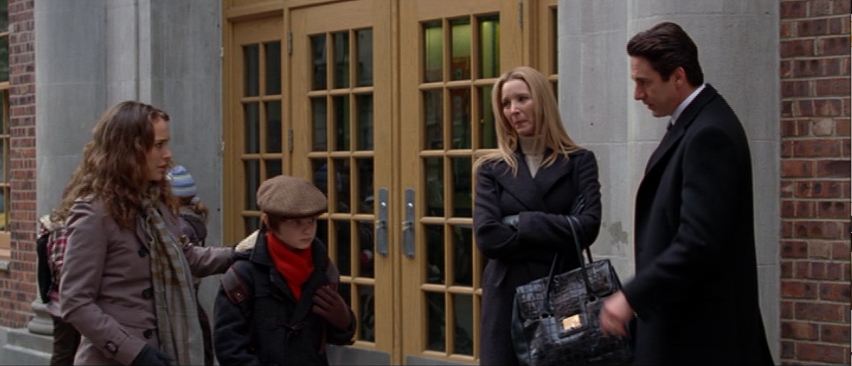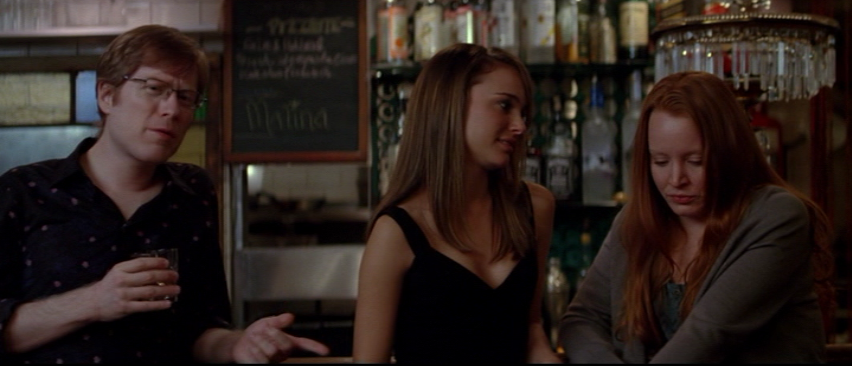We held a poll for new DVD write-ups and you chose this one. It's your fault! ;)
You're familiar with the ol' term "edited with a chainsaw", yes? Thist post will surely be written by one. Edited with a chainsaw is an odd phrase since it scapegoats the editor when messy jumbled narrative choices and general incoherence are just as often the fault of screenwriters and directors. Not that editing can't make things worse. Quick, explain what happened in that final battle on the rainbow bridge in Thor because I still don't know. If I ever meet Paul Rubell I will definitely ask him. I don't mean to single Mr Rubell out among editors but my mind lept to Thor because The Other Woman -- our topic du jour -- also stars Her Lady of Ubiquity Natalie Portman. But, really, Thor isn't particularly egregious as incoherent actioners go. Continuity and visual coherence are no longer the end goals they once were. (Thanks for nothing, Paul Greengrass!)
 Bad Lawyer! Natalie's sexting when she ought to be working.
Bad Lawyer! Natalie's sexting when she ought to be working.
When people use that chainsaw phrase today -- if they do at all - it merely means "this makes no sense!" or perhaps "I hate this". It's flexible which is why it's still useful as verbal shorthand even though there's been no actual "cutting" of film in some time.
What are we even talking about? Oh, yes, The Other Woman: It makes no sense. I hated it.
I wish flexibility were a trait we could assign to writer/director Don Roos' latest but for as much as the new movie twists and bends, frequently and often in its attempt to be several different movies or perhaps a television series, it's always snapping and breaking rather than stretching and settling into new poses. My first urge is to call it incoherent (hence the editing cliché) but that's not quite right. The narrative is neither ambitious nor inept enough for true incoherence. But one thing is for certain, The Other Woman does not know itself. It's vague whenever it needs to be precise and bloated whenever it needs to trim.
Is it a romantic drama? Quite often but only for a few minutes at a time.
Is it a flashback picture about a hasty romantic decision? Well, it's structured a bit like that at first but then you realize the flashback is over and it was more like oddly placed first act decorative exposition and you're back in the present.
Is it a comedy? Not really, although there are a few jokes.
Is it a story about a woman who is way too immature to parent, suddenly thrust into the Stepmom role? It seems like that but then why all the romance? It keeps hinting that there's more to her than immaturity though that "more" never shows itself.
 This blended family isn't blending well at all. Both moms, biological & step, like to verbally lash out at everyone around them.
This blended family isn't blending well at all. Both moms, biological & step, like to verbally lash out at everyone around them.
Is it a thorny drama about blended families? Yes, half the time.
Is it a piercing drama about grief and the fragility of new life and love? At times but not for very long at a time.
Do all of these separate movies star two hugely unlikable women, who are members of the First Wives Club and the Young Homewreckers of America club? Ding! Ding! Ding!
Lisa Kudrow and Don Roos have been frequent collaborators for years now, and though he usually casts her as very bitter or frustrated women, they've been able to find such interesting layers of hurt and comedy in the roles. Sometimes she's an outright revelation (particularly in The Opposite of Sex and in her online series Web Therapy). Natalie Portman, who was in the process of winning the Oscar when this film finally arrived, is an uneven actress and she hits some notes here very well (she doesn't shy away from Amelia's immaturity or difficulty at thinking beyond the moment) but it's a repetitive and undercooked performance.
You can forgive a lot when you watch bad movies if the protagonist or antagonist or supporting characters are either straight up likeable or charismatically flawed. But virtually no one in The Other Woman lays claim to your heart. Two of the most generally "likeable" characters, played by Lauren Ambrose and Anthony Rapp, pop in from time to time to provide a laugh line or a sympathetic ear but they're in so little of the movie that it's difficult to get any sort of bead on who they are outside of their trio friendship with Natalie Portman and The Other Woman doesn't care enough about these friendships to suggest anything about their strength.
 Rapp, Portman and Ambrose are friends. But how much and for how long?
Rapp, Portman and Ambrose are friends. But how much and for how long?
The three main characters are walking wounded nightmares: Amelia (Natalie Portman) is bitchy, self-deluding, immature and hypocritical (she married a cheater and despises cheaters and doesn't view her actions as inappropriate even though she actively pursues the married man); Carolyne (Lisa Kudrow) is the shrewish ex-wife who is so brittle and unforgiving that you can't help but be glad that her husband escaped her; Jack (Scott Cohen) doesn't make a whole lot of sense and remains a cypher since the film keeps drifting away from him towards the women and his son. You know there's more to him but he only reveals his hurt in the final moments and then, promptly and all too easily, seems to segue immediately back into Father Knows Best mode.
The same day I watched the film I attended a party and I was trying to explain my problem with the film to a friend. Since I was a little buzzed from drinks my critique veered uncomfortably away from the verbal into something approaching charades format; I played Natalie Portman and acted out One Scene As Every Scene, if you know what I mean. It went exactly like this (verbatim!) ...though I wasn't wearing a wig.

This happens over and over again in the movie whether we're in coming-of-age land, the flashback movie, in romantic drama territory, the family strife issues film or baby grief catharsis. All five of the movies we're watching have the same scene: Natalie lashes out, apologizes, feels bad about herself, and continues to blame other people; Repeat for the entire movie until she grows up a teensy bit at the end in an unconvincing and unclimactic way.
Don Roos has made two very good features in the past (The Opposite of Sex and Happy Endings) which both demonstrated a unique voice with a deft command of interlocking character arcs, plotty developments that inform the arcs in question, and the ability to conjure a whole passel of hugely flawed somewhat off-putting characters that manage to be endearing or fascinating because of the good humor, complexity and depth of the characterizations. The Other Woman shares many of these same structural elements but none of the success with them. It's tough to say what went wrong but it went very wrong. Best to call this one That Other Movie, ignore it, and rewatch one of those earlier fine pictures instead. D